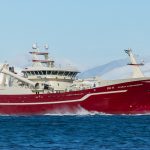About the fishery
The Japanese distant-water pole and line fishery started in the 1950s and currently comprises about 50 distant-water vessels of which 25 vessels are active in the fishery. The total catch is about 40,000 to 50,000 Metric Tonnes and the client group’s boats catch around 10% of that (approximately 4,000MT). The fishery is seasonal and takes place from November to May in the South Pacific moving further north and east of Japan between September and October.
Assessment findings
The skipjack stock in the Western and Central Pacific Ocean is assessed as being within safe biological limits. The fishery was found to be taking place in such a way that the productivity of the stocks is being protected and with minimal impacts on other marine life. As part of its ongoing certification, Tosakatsuo Skipjack Pole and Line Fishery is to promote and support management actions put forward to further improve and formalise the international and Japanese fisheries management framework.
Quotes
Mr Hiroyuki Myojin, President of Tosakatsuo Suisan Co. Ltd. says: “We are proud to have achieved independent verification that our skipjack tuna pole and line fishery, which has been developed by Japanese fishermen for centuries, is indeed a sustainable fishing tradition. I would like to give my gratitude to all people who supported this certification. With our certification we hope to save Japan’s proud tradition of skipjack tuna pole and line fishing from extinction and preserve it for generations to come. We also hope it will contribute to Japanese consumers’ awareness of the importance of sustainable fisheries. We will continue our efforts to make this fishery shine again.”
Rupert Howes, Chief Executive of the MSC says: “I congratulate the Tosakatsuo Suisan fishery on this important certification. This assessment further demonstrates that tuna fisheries can be assessed against MSC’s rigorous science based standard for environmentally responsible and sustainable fishing, and achieve certification. On the market side, given the huge and largely unfulfilled demand from seafood buyers in Europe, North America and Japan for credible, internationally recognised certified sustainable tuna supplies, I have no doubt that there will be considerable interest both domestically and from international seafood markets in this certification. I hope this certification will encourage other tuna fisheries and species around the world to come forward into the assessment process.”
Kozo Ishii, MSC Programme Director Japan, adds his congratulations: “This certification is an important milestone. I am confident this skipjack tuna fishery will benefit from the fast growing demand for certified sustainable seafood, and expect that Japanese consumers’ awareness of the importance of sustainable fisheries will increase further as skipjack tuna is an iconic fish for Japanese people.”








